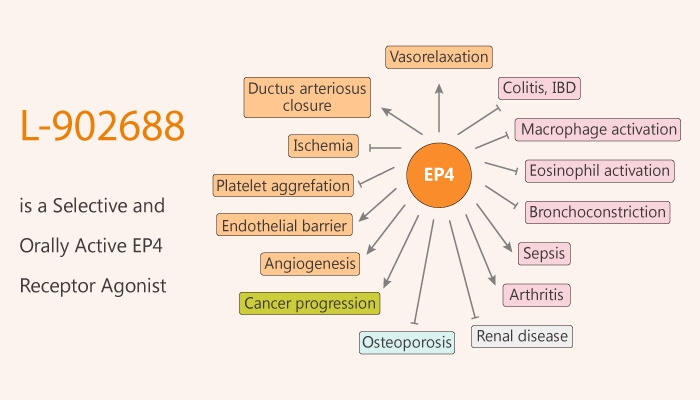Right ventricular (RV) hypertrophy and failure are the main causes of morbidity and mortality with pulmonary arterial hypertension (PAH) in many patients.
In the vascular system, Prostaglandin E2 (PGE2) can activate four different prostanoid E (EP) receptors, including EP1, EP2, EP3, and EP4. Prostanoid receptors (IP, EP2, EP4, and DP) can bind to the stimulatory G protein (Gs) to elevate intracellular cyclic adenosine monophosphate (cAMP) and promote vascular relaxation.
In this article, we will introduce a potent, selective and orally active EP4 receptor agonist, L-902688.

We will concisely describe this compound in vitro and in vivo.
Firstly, in endothelial cells, pretreatment with the EP4 antagonist AH23848 can significantly block L-902688-induced EP4 signaling. In addition, AH23848 with TGF-β can obviously reverse the L-902688-induced inhibition of α-SMA and Twist expression in HUVEC cells. All in all, the above results, prove that L-902688 can relieve TGF-β1-induced EndMT by activating EP4 signaling.
Extreme deposition of the extracellular matrix in mesenchymal cells or fibroblasts leads to Cardiac fibrosis. As we all know, IP expression always exhibits a low expression, whereas EP4 expression remains stable. The progression of cardiac fibrosis contains the transformation of fibroblasts into myofibroblasts and EndMT.
Furthermore, EndMT in cardiac fibrosis is a complex process, the specific markers of endothelial cells lost, such as NOS, E-cadherin, and CD146 et al. Additionally, mesenchymal cell markers overexpress in cells.
Nextly, in order to examine whether L-902688 affects cardiac fibrosis with PAH. L-902688 treatment is treated in MCT rats for 21 days. L-902688 treatment reduces right ventricle fibrosis in the monocrotaline (MCT)-induced PAH rat model.
At last, IHC shows that MCT rats show higher expression levels of α-SMA in the endocardium of the right ventricle than control rats.
However, L-902688 can significantly reduce α-SMA expression in right ventricular (RV) tissue. this furtherly proves that EP4 signaling plays a critical role in regulating cardiac fibrosis.
In conclusion, L-902688 inhibits Twist and α-SMA expression and reverses RV cardiac fibrosis in vitro and in vivo. EP4 signaling is beneficial for reversing cardiac fibrosis.
Reference:
Lai YJ, et al. Int J Mol Sci. 2018 Mar 3;19(3). pii: E727.